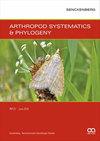在分类实践中被高估的一个分类特征:基于形态学和分子系统发育的1877年索氏步蛾的综合分类修订(直翅目:灰门总科;蟋蟀科;Gryllinae)
IF 1.8
2区 农林科学
Q2 ENTOMOLOGY
引用次数: 0
摘要
半球形的头部在蟋蟀中很普遍,所以罕见的蟋蟀有一个独特的头部形式是非常不寻常的。在之前的研究中,这种特殊的特征可能是区分和识别这些蟋蟀的重要特征之一。但是这种特殊的头部形状真的反映了一种明确的分类关系吗?loxoblemus属的种具有典型的截形头;棘棘属的种类有一个更夸张的截形头,其前端甚至延伸成板状。米提斯属是相对不寻常的,在这个属的种有两个球形或截形头。这些物种之间有什么关系?头侧的形状是否完全反映了这些物种的自然分类?基于这些问题,本研究运用物种定义和形态分类方法,探讨了Mitius、Stephoblemmus和Loxoblemmus属间和属内的种间关系,得出以下主要结论:(1)Mitius和Stephoblemmus与Loxoblemmus既有亲缘关系,又有区别;(2)密属植物有两种类型的花序(截形花序和圆形花序),但这一特征使其不能被划分为自然类群;(3)提出了1个属同义词和3个种同义词(Mitius Gorochov, 1985 syn. n., Mitius splendens (Shiraki, 1930) syn. n., Mitius eryuanensis Yuan, Xie &;刘,2021 synus brevipennis,袁,Ma &;Gu, 2022 synn .),并提出了7种新的状态组合(Stephoblemmus blennus (Saussure, 1877)梳子。(肖邦,1937)梳子。n. Stephoblemmus enatus Gorochov, 1994梳子。萧邦,1928)梳子。名词,小石斑病螨(Shiraki, 1911)梳子。n.微小棘球绦虫(Yang &杨,1995)梳。n.;考伯,2007)梳。n)。这些研究表明,表面上明显不同的羽毛形状可能并不总是反映正确的灰虱科物种关系,往往需要更多的分类特征和分类技术的结合来揭示真正的分类关系。本文章由计算机程序翻译,如有差异,请以英文原文为准。
On a taxonomic feature that has been overestimated in classification practice: an integrative taxonomic revision of Stephoblemmus Saussure, 1877 based on morphology and molecular phylogeny (Orthoptera: Grylloidea; Gryllidae; Gryllinae)
The hemispherical head is prevalent in Gryllinae crickets, so the rare crickets that have a unique form of head will be extremely unusual. In previous studies, this special feature can be one of the important features to distinguish and identify these crickets. But does this particular head shape truly reflect a clear-cut taxonomic relationship? The species of the genus Loxoblemmus have a typical truncate head; species of the genus Stephoblemmus have a more exaggerated truncate head, with the frontal end even extending into a lamellar. The genus Mitius is relatively unusual in that species of this genus have both globose or truncate heads. How are these species related? Does the cephalic shape perfectly reflect the natural classification of these species? Based on these questions, the study applied species definition and morphological classification to explore the intergeneric and intrageneric species relationships of the genera Mitius , Stephoblemmus , and Loxoblemmus , and derived the following main conclusions: (1) Mitius and Stephoblemmus are related and distinct from Loxoblemmus ; (2) Mitius species bear two types of frons (truncated and rounded), but this feature disallows them to be classified as natural groups; (3) one genus synonym and three species synonyms are raised ( Mitius Gorochov, 1985 syn. n. , Mitius splendens (Shiraki, 1930) syn. n. , Mitius eryuanensis Yuan, Xie & Liu, 2021 syn. n. and Mitius brevipennis Yuan, Ma & Gu, 2022 syn. n. ), and seven new status combinations are proposed ( Stephoblemmus blennus (Saussure, 1877) comb. n. , Stephoblemmus castaneus (Chopard, 1937) comb. n. , Stephoblemmus enatus Gorochov, 1994 comb. n. , Stephoblemmus flavipes (Chopard, 1928) comb. n. , Stephoblemmus minor (Shiraki, 1911) comb. n. , Stephoblemmus minutulus (Yang & Yang, 1995) comb. n. and Stephoblemmus vaturu (Otte & Cowper, 2007) comb. n. ). The studies indicated that frons shapes that appear to be significantly different might not always reflect the correct Gryllinae species relationships and a combination of more taxonomic features and taxonomic techniques is needed often to reveal the true taxonomic relationships.
求助全文
通过发布文献求助,成功后即可免费获取论文全文。
去求助
来源期刊

Arthropod Systematics & Phylogeny
Agricultural and Biological Sciences-Insect Science
CiteScore
2.50
自引率
5.60%
发文量
26
审稿时长
12 weeks
期刊介绍:
Arthropod Systematics & Phylogeny releases three times per year. Research fields covered are the taxonomy, morphology/anatomy, phylogeny (molecular or morphology-based), historical biogeography and palaeontology of arthropod taxa.
Arthropod Systematics & Phylogeny is the successor of Entomologische Abhandlungen, formerly published by the Museum of Zoology Dresden, Germany.
 求助内容:
求助内容: 应助结果提醒方式:
应助结果提醒方式:


